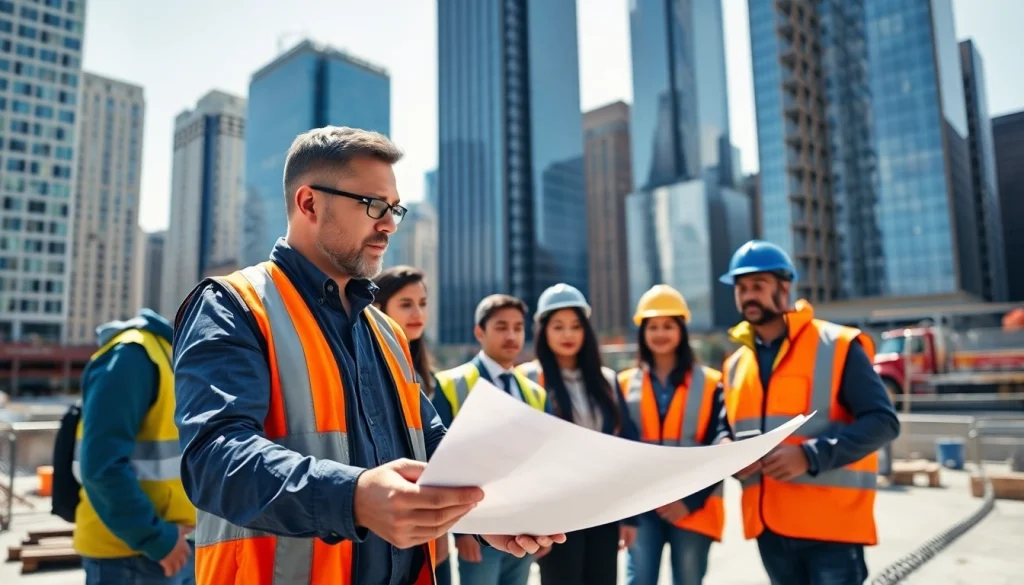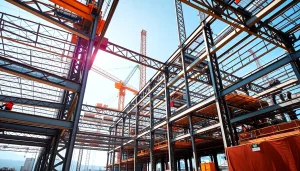Strategies for Effective Manhattan Construction Manager Practices in Urban Developments

Understanding the Role of a Manhattan Construction Manager
The role of a Manhattan Construction Manager is pivotal in ensuring that construction projects are executed efficiently and effectively. Serving as the bridge between a myriad of stakeholders—including owners, architects, subcontractors, and suppliers—this position demands a blend of technical expertise, leadership abilities, and adept communication skills. A Manhattan Construction Manager oversees project development from inception to completion, navigating the complexities of urban construction environments.
Key Responsibilities and Skills
At its core, the role encompasses several critical responsibilities:
- Project Planning and Scheduling: Developing comprehensive project plans that outline timelines, resources, and budgetary constraints is essential. A well-structured schedule helps in tracking progress and aligning team efforts.
- Team Coordination: Effective collaboration among various project stakeholders is crucial. The construction manager must facilitate communication between architects, engineers, and contractors to ensure project goals are met seamlessly.
- Quality Control: Ensuring that all construction work meets specified standards and codes is paramount. This involves regular site inspections and adherence to best practices throughout the construction process.
- Budget Management: Keeping budgets under control while managing resource allocation effectively is a challenge many construction managers face. This requires understanding cost projections and financial monitoring of the project.
- Problem-Solving: Construction projects inevitably face unforeseen circumstances. The ability to quickly identify issues and devise solutions is vital to maintaining project timelines and budgets.
Moreover, a Manhattan Construction Manager should possess skills such as risk management, negotiation, and leadership to lead diverse teams effectively. Understanding local construction regulations and industry standards also plays a significant role in achieving project success.
Importance of Collaboration in Construction Management
Collaboration is the cornerstone of effective construction management. Without it, projects can become plagued with miscommunication, delays, and budget overruns. A successful Manhattan Construction Manager cultivates a collaborative culture among all parties involved in the project.
For instance, regular meetings with team members to discuss progress and address challenges encourage transparency and accountability. Utilizing collaborative tools and technologies can enhance communication, allowing for real-time updates and immediate feedback. When everyone is informed and engaged, projects are more likely to meet their objectives on time and within budget.
Impact on Project Success
The effectiveness of a Manhattan Construction Manager can significantly influence the overall success of a project. By implementing best practices in planning, risk management, and quality control, a construction manager enhances not only the efficiency of the project but also its final output.
Successful projects not only fulfill their intended purpose but also reflect positively on all stakeholders, ultimately enhancing reputations and opening doors for future opportunities. Measuring project success can involve looking at metrics such as on-time completion rates, budget adherence, and client satisfaction levels.
Challenges Faced by Manhattan Construction Managers
The construction landscape, particularly in urban settings like Manhattan, is fraught with challenges that can complicate even the best-laid plans. Understanding these challenges is crucial for effective management.
Handling Budget Constraints
Budget constraints are perhaps the most significant challenge faced by construction managers. With fluctuating material costs and labor rates, maintaining a project within budget requires constant vigilance and adaptability.
Implementing a robust budget management system, conducting regular financial assessments, and establishing contingencies can help mitigate financial risks. Effective negotiation with suppliers and subcontractors can also lead to cost savings, ensuring the project remains on track financially.
Navigating Regulatory Requirements
Construction in Manhattan entails navigating a complex web of local regulations, zoning laws, and safety codes. A Manhattan Construction Manager must stay up-to-date on these legal frameworks to ensure compliance throughout the construction process.
This may involve working closely with legal experts and local government agencies to procure necessary permits and approvals. Failure to comply with regulatory requirements can result in costly delays, fines, and legal challenges.
Addressing Labor Shortages
The construction industry is currently facing a labor shortage, exacerbated by an aging workforce and a lack of skilled tradespeople entering the profession. This shortage can delay projects and increase costs, making workforce management a priority for construction managers.
To address this challenge, construction managers must engage in proactive talent management strategies, including recruiting and retaining skilled workers. Investing in workforce development and training programs can foster a more resilient and capable team that aligns with the project’s needs.
Best Practices for Manhattan Construction Management
Adopting best practices in construction management can significantly improve project outcomes. Here are several effective approaches:
Implementing Effective Communication
Communication is vital in construction management. A Manhattan Construction Manager should establish clear communication channels to ensure that everyone involved is on the same page. This means not only sharing key updates but also actively soliciting input and feedback from team members.
Regular updates and check-ins, whether through in-person meetings, emails, or project management software, can help alleviate misunderstandings and keep the project aligned with its goals. Emphasizing an open-door policy fosters a culture where team members feel valued and encouraged to voice their thoughts.
Utilizing Technology and Innovations
The construction industry has embraced numerous technological advancements that streamline processes and enhance productivity. Tools such as Building Information Modeling (BIM), project management software, and drones for site surveys can transform the way projects are managed.
Adopting these technologies not only increases efficiency but also improves accuracy in estimating costs and timelines. Moreover, they facilitate better collaboration among stakeholders by providing a centralized platform for information sharing and communication.
Adopting Sustainable Practices
Sustainability is becoming an essential aspect of construction management. A Manhattan Construction Manager should prioritize sustainable practices to minimize environmental impact and enhance the project’s long-term viability.
This can include utilizing eco-friendly materials, implementing energy-efficient designs, and ensuring waste is minimized throughout the construction process. Clients are increasingly seeking sustainability-focused builders, so aligning with these values can also boost a company’s marketability and client satisfaction.
Measuring the Success of a Manhattan Construction Manager
To determine the effectiveness of a Manhattan Construction Manager, specific success metrics should be established. Monitoring these indicators not only helps in assessing performance but also in identifying areas for improvement.
Key Performance Indicators (KPIs)
KPIs provide a measurable way to evaluate project success and managerial performance. Some essential KPIs for construction management might include:
- Project Completion Time: Tracking whether projects are completed on or ahead of schedule.
- Budget Variance: Measuring the difference between budgeted and actual project costs.
- Quality Metrics: Assessing defect rates or rework instances during and post-construction.
- Safety Incidents: Monitoring workplace safety and incidents rates to ensure compliance with regulations.
Client Satisfaction Metrics
Client satisfaction is a direct reflection of a construction manager’s capability. Gathering feedback through surveys or post-project evaluations can provide valuable insights into areas of success and those needing improvement.
Metrics such as customer retention rates, repeat business, or client referrals can serve as robust indicators of client satisfaction and project success. Managers should prioritize building strong relationships with clients to foster trust and collaboration.
Effective Reporting and Documentation
Meticulous documentation is critical in construction management. Proper reporting helps track project progress, provides transparency, and supports decision-making processes. Utilizing standardized reporting templates can streamline documentation efforts and ensure consistency.
Regularly compiling and reviewing project reports helps in assessing progress against KPIs, project milestones, and budget adherence. This practice facilitates proactive identification of issues and adjustments needed to stay on track.
Future Trends in Manhattan Construction Management
As the construction industry evolves, so too must construction management practices. Staying abreast of emerging trends is key for a Manhattan Construction Manager aiming for success in increasingly competitive markets.
Embracing Digital Transformation
The digital transformation of the construction industry is reshaping traditional practices. From cloud-based project management tools to data analytics and artificial intelligence, technology is enhancing project management capabilities. A forward-thinking construction manager should explore and adopt these innovations to increase efficiency and improve decision-making processes.
Focus on Resilience and Adaptability
In the face of challenges such as climate change and fluctuating market conditions, resilience has become a critical quality for construction managers. Developing adaptable project management strategies allows for flexibility in the face of change while maintaining focus on project goals and client needs.
Enhancing Workforce Development
As the industry contends with labor shortages, investing in workforce development is crucial. A Manhattan Construction Manager should spearhead initiatives aimed at training and upskilling existing employees while also attracting new talent to the field. By fostering a culture of continuous learning and professional growth, organizations can build a robust workforce ready to meet the challenges of tomorrow.







